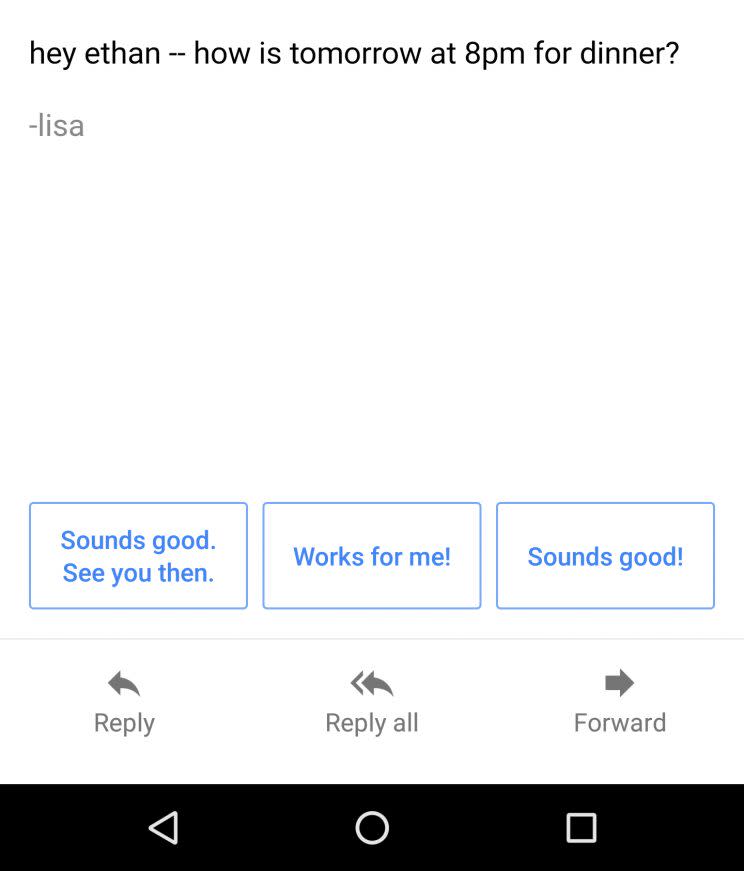Gmail 'Smart Reply' feature is a reminder Google scans your email

Google (GOOG, GOOGL) has been rolling out Gmail’s new Smart Reply feature over the past few weeks on its Android and iOS apps. The buttons allow for quick, automatic responses to questions that are raised in the email.
For example, if an email has the phrase, “how about dinner at 8?,” the buttons may say “Sounds good!” along with two other canned responses. The buttons do not send the message; they merely populate a reply email with the phrase of your choice. You then can add more or hit the send button.
While new to Gmail’s 1 billion-plus users, the buttons were implemented on Google’s Inbox app last year. “[Replying] to email on mobile is a real pain, even for short replies,” wrote Google senior research scientist Greg Corrado when Inbox launched the functionality. “What if there were a system that could automatically determine if an email was answerable with a short reply, and compose a few suitable responses that I could edit or send with just a tap?”

In the recent wider rollout—the Inbox app is nowhere near as popular as the Gmail apps—reception has been mixed. On Twitter, some praised the “machine learning” and “loving” these “sweet” buttons. Others were confused at the tech world “solving” an imaginary problem: If typing on mobile is really a pain as Corrado writes, people would be calling—not texting, which is which has surpassed calling in the US.
Uh, is Google reading my email?
And, not surprisingly, many users expressed discomfort at these canned responses.
The perceived weirdness makes sense. To serve up these buttons, Google’s software must analyze (read: read) your emails. But while this may feel like an unwelcome invasion of privacy, the buttons serve an important, albeit unintended, purpose: They’re a good reminder that the free email inbox is not sacrosanct.
Google’s systems have been reading your email for years, scanning for keywords in your correspondence with which to tailor advertising.
Many people do not read privacy policy or terms of service agreements when they sign up, or updates, but here is what users agreed to. Google writes in plain English in its policy: “Our automated systems analyze your content (including emails) to provide you personally relevant product features, such as customized search results, tailored advertising, and spam and malware detection.”
This is not unique to Google. By using Yahoo email, another free email provider, users agree to a similar privacy policy. “Yahoo’s automated systems analyze all communications content (such as Mail and Messenger content including instant messages and SMS messages) to, without limitation, provide personally relevant product features and content, to match and serve targeted advertising and for spam and malware detection and abuse protection,” the policy reads. (Yahoo is the parent company of Yahoo Finance.)
Agreeing to these policies is traditionally the barter a person makes to use a free service. The technology, massive server fees, and other expenses add up, and advertising pays those bills. So well, in fact, that it has boosted Google’s parent company Alphabet to be the second-largest company by market cap with over $681 billion as of June.
Ethan Wolff-Mann is a writer at Yahoo Finance focusing on consumer issues, tech, and personal finance. Follow him on Twitter @ewolffmann. Got a tip? Send it to tips@yahoo-inc.com.
Read more:
How CEOs reacted to Trump’s withdrawal from the Paris agreement
Study shows how GOP plan would lower premiums: ditching costly, sick people
How the Obamacare repeal could affect your employer insurance
The biggest problem with robots taking jobs may not be unemployment—yet
What Facebook and Twitter think they know about you
Online savings accounts are raising rates. Big banks aren’t.
